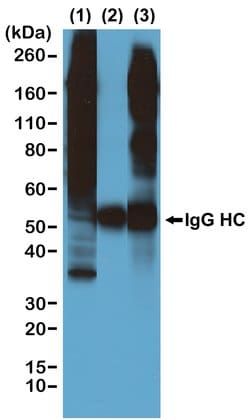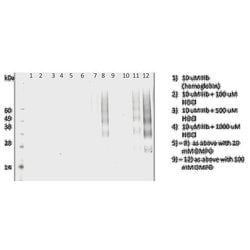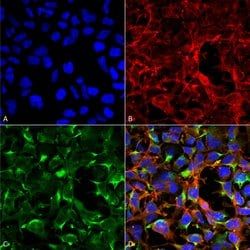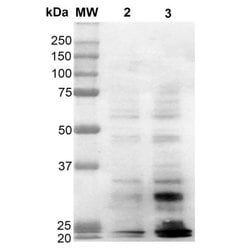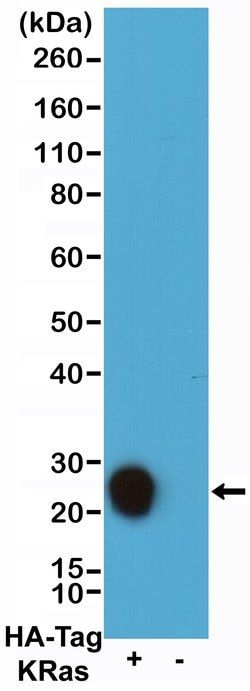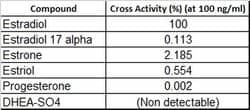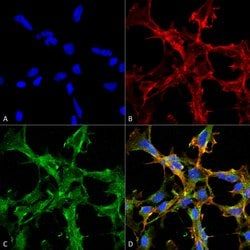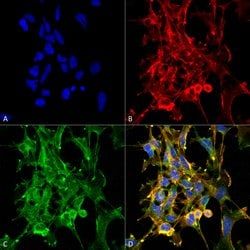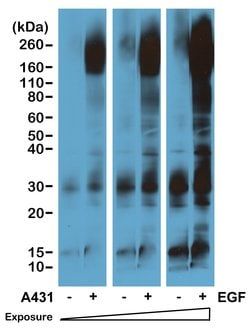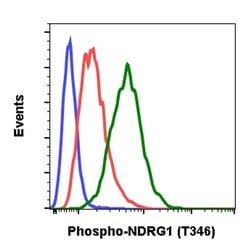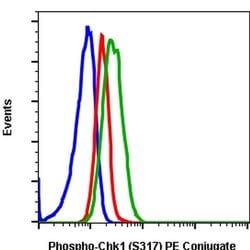PIMA527977
Phosphotyrosine Recombinant Rabbit Monoclonal Antibody (RM111), Invitrogen™
Manufacturer: Thermo Scientific
Select a Size
| Pack Size | SKU | Availability | Price |
|---|---|---|---|
| Each of 1 | PIMA527977-Each-of-1 | In Stock | ₹ 50,507.50 |
PIMA527977 - Each of 1
In Stock
Quantity
1
Base Price: ₹ 50,507.50
GST (18%): ₹ 9,091.35
Total Price: ₹ 59,598.85
Antigen
Phosphotyrosine
Classification
Recombinant Monoclonal
Concentration
1 mg/mL
Formulation
PBS with 1% BSA, 50% glycerol and 0.09% sodium azide
Host Species
Rabbit
Purification Method
Protein A
Regulatory Status
RUO
Target Species
Chemical
Product Type
Antibody
Isotype
IgG
Applications
ChIP Assay, ELISA, Immunocytochemistry, Immunohistochemistry, Immunoprecipitation
Clone
RM111
Conjugate
Unconjugated
Gene Alias
Phosphotyrosine; pTyr; pY
Immunogen
Phosphotyrosine-BSA conjugate
Quantity
100μg
Primary or Secondary
Primary
Content And Storage
-20°C
Form
Liquid
Target Molecule
Chemical
Description
- Recombinant rabbit monoclonal antibodies are produced using in vitro expression systems
- The expression systems are developed by cloning in the specific antibody DNA sequences from immunoreactive rabbits
- Then, individual clones are screened to select the best candidates for production
- The advantages of using recombinant rabbit monoclonal antibodies include: better specificity and sensitivity, lot-to-lot consistency, animal origin-free formulations, and broader immunoreactivity to diverse targets due to larger rabbit immune repertoire
- The role of tyrosine phosphorylation in transduction of the mitogenic signal from transmembrane receptors and in transformation by oncogene tyrosine kinases has been the subject of intense investigation for several years
- While the phosphorylation of specific tyrosine residues has been shown to be a primary mechanism of signal transduction during normal mitogenesis, cell cycle progression and oncogenic transformation, its role in other areas such as differentiation and gap junction communication, is a matter of active and ongoing research
- Antibodies that specifically recognize phosphorylated tyrosine residues have proved to be invaluable to the study of tyrosine -phosphorylated proteins and the biochemical pathways in which they function
- The fluorescein (FITC) conjugate of clone PY20 anti-phosphotyrosine is especially useful for the detection of these P-Tyr proteins in immunohistochemical and immunocytochemical protocols in situations wherein the use of a secondary antibody would complicate detection of the protein(s) of interest.
Compare Similar Items
Show Difference
Antigen: Phosphotyrosine
Classification: Recombinant Monoclonal
Concentration: 1 mg/mL
Formulation: PBS with 1% BSA, 50% glycerol and 0.09% sodium azide
Host Species: Rabbit
Purification Method: Protein A
Regulatory Status: RUO
Target Species: Chemical
Product Type: Antibody
Isotype: IgG
Applications: ChIP Assay, ELISA, Immunocytochemistry, Immunohistochemistry, Immunoprecipitation
Clone: RM111
Conjugate: Unconjugated
Gene Alias: Phosphotyrosine; pTyr; pY
Immunogen: Phosphotyrosine-BSA conjugate
Quantity: 100μg
Primary or Secondary: Primary
Content And Storage: -20°C
Form: Liquid
Target Molecule: Chemical
Antigen:
Phosphotyrosine
Classification:
Recombinant Monoclonal
Concentration:
1 mg/mL
Formulation:
PBS with 1% BSA, 50% glycerol and 0.09% sodium azide
Host Species:
Rabbit
Purification Method:
Protein A
Regulatory Status:
RUO
Target Species:
Chemical
Product Type:
Antibody
Isotype:
IgG
Applications:
ChIP Assay, ELISA, Immunocytochemistry, Immunohistochemistry, Immunoprecipitation
Clone:
RM111
Conjugate:
Unconjugated
Gene Alias:
Phosphotyrosine; pTyr; pY
Immunogen:
Phosphotyrosine-BSA conjugate
Quantity:
100μg
Primary or Secondary:
Primary
Content And Storage:
-20°C
Form:
Liquid
Target Molecule:
Chemical
Antigen: Phospho-NDRG1 (Thr346)
Classification: Recombinant Monoclonal
Concentration: 0.5 mg/mL
Formulation: PBS with 0.1% BSA, 50% glycerol and 0.02% sodium azide; pH 7.4
Host Species: Rabbit
Purification Method: Protein A/G
Regulatory Status: RUO
Target Species: Human, Mouse
Product Type: Antibody
Isotype: IgG κ
Applications: Flow Cytometry, Western Blot
Clone: NDRG1T346-F5
Conjugate: Unconjugated
Gene Alias: CAP43; CMT4D; differentiation-related gene 1 protein; DRG1; DRG-1; GC4; HMSNL; Ndr1; Ndrg1; Ndrl; nickel-specific induction protein Cap43; NMSL; N-myc downstream regulated 1; N-myc downstream regulated gene 1; N-myc downstream-regulated gene 1 protein; Protein Ndr1; protein NDRG1; protein regulated by oxygen-1; PROXY1; Reducing agents and tunicamycin-responsive protein; Rit42; RTP; TARG1; TDD5
Immunogen: A synthetic phospho-peptide corresponding to residues surrounding Thr346 of human phospho NDRG1.
Quantity: 200μL
Primary or Secondary: Primary
Content And Storage: -20°C
Form: Liquid
Target Molecule: __
Antigen:
Phospho-NDRG1 (Thr346)
Classification:
Recombinant Monoclonal
Concentration:
0.5 mg/mL
Formulation:
PBS with 0.1% BSA, 50% glycerol and 0.02% sodium azide; pH 7.4
Host Species:
Rabbit
Purification Method:
Protein A/G
Regulatory Status:
RUO
Target Species:
Human, Mouse
Product Type:
Antibody
Isotype:
IgG κ
Applications:
Flow Cytometry, Western Blot
Clone:
NDRG1T346-F5
Conjugate:
Unconjugated
Gene Alias:
CAP43; CMT4D; differentiation-related gene 1 protein; DRG1; DRG-1; GC4; HMSNL; Ndr1; Ndrg1; Ndrl; nickel-specific induction protein Cap43; NMSL; N-myc downstream regulated 1; N-myc downstream regulated gene 1; N-myc downstream-regulated gene 1 protein; Protein Ndr1; protein NDRG1; protein regulated by oxygen-1; PROXY1; Reducing agents and tunicamycin-responsive protein; Rit42; RTP; TARG1; TDD5
Immunogen:
A synthetic phospho-peptide corresponding to residues surrounding Thr346 of human phospho NDRG1.
Quantity:
200μL
Primary or Secondary:
Primary
Content And Storage:
-20°C
Form:
Liquid
Target Molecule:
__
Antigen: MYL9/MYL12
Classification: Recombinant Monoclonal
Concentration: 0.5 mg/mL
Formulation: PBS with 0.1% BSA, 50% glycerol and 0.02% sodium azide; pH 7.4
Host Species: Rabbit
Purification Method: Protein A/G
Regulatory Status: RUO
Target Species: Human, Mouse
Product Type: Antibody
Isotype: IgG κ
Applications: ELISA, Functional Assay, Immunohistochemistry
Clone: AWBMyl9F6 (F-6)
Conjugate: Unconjugated
Gene Alias: 1500001M02Rik; 20 kDa myosin light chain; 2900073G15Rik; AI327049; AI838292; brain specific myosin regulatory light chain; C77744; C80200; Epididymis secretory protein Li 24; HEL-S-24; LC20; MLC2; MLC-2; MLC20; MLC-2A; MLC-2B; MLC-2C; MLCB; MLC-B; MRCL3; MRLC1; Mrlc2; MRLC3; Mrlcb; Myl12a; MYL12B; MYL2B; MYL9; MYLC2B; Mylc2c; myosin light chain 12A; myosin light chain 12B; myosin light chain 9; myosin light chain, regulatory B; myosin light chain, regulatory B-like; myosin light chain, regulatory C; myosin regulatory light chain 1; myosin regulatory light chain 12A; Myosin regulatory light chain 12B; myosin regulatory light chain 2; myosin regulatory light chain 2, nonsarcomeric; Myosin regulatory light chain 2, smooth muscle isoform; myosin regulatory light chain 20 kDa; myosin regulatory light chain 2-A, smooth muscle isoform; Myosin regulatory light chain 2-B, smooth muscle isoform; myosin regulatory light chain 3; myosin regulatory light chain 9; Myosin regulatory light chain MRLC1; myosin regulatory light chain MRLC2; Myosin regulatory light chain MRLC3; myosin regulatory light chain RLC-A; myosin regulatory light chain-B; myosin regulatory light polypeptide 9; Myosin RLC; myosin RLC-A; Myosin RLC-B; myosin, light chain 12A, regulatory, non-sarcomeric; myosin, light chain 12B, regulatory; myosin, light chain 9, regulatory; myosin, light polypeptide 9, regulatory; myosin, light polypeptide, regulatory, non-sarcomeric (20kD); MYRL2; NMDA receptor-interacting protein; RGD1309537; RLC; Rlc-a; RLC-B; RLC-C; SHUJUN-1
Immunogen: N-terminal peptide of Myl9
Quantity: 100μg
Primary or Secondary: Primary
Content And Storage: -20°C
Form: Liquid
Target Molecule: __
Antigen:
MYL9/MYL12
Classification:
Recombinant Monoclonal
Concentration:
0.5 mg/mL
Formulation:
PBS with 0.1% BSA, 50% glycerol and 0.02% sodium azide; pH 7.4
Host Species:
Rabbit
Purification Method:
Protein A/G
Regulatory Status:
RUO
Target Species:
Human, Mouse
Product Type:
Antibody
Isotype:
IgG κ
Applications:
ELISA, Functional Assay, Immunohistochemistry
Clone:
AWBMyl9F6 (F-6)
Conjugate:
Unconjugated
Gene Alias:
1500001M02Rik; 20 kDa myosin light chain; 2900073G15Rik; AI327049; AI838292; brain specific myosin regulatory light chain; C77744; C80200; Epididymis secretory protein Li 24; HEL-S-24; LC20; MLC2; MLC-2; MLC20; MLC-2A; MLC-2B; MLC-2C; MLCB; MLC-B; MRCL3; MRLC1; Mrlc2; MRLC3; Mrlcb; Myl12a; MYL12B; MYL2B; MYL9; MYLC2B; Mylc2c; myosin light chain 12A; myosin light chain 12B; myosin light chain 9; myosin light chain, regulatory B; myosin light chain, regulatory B-like; myosin light chain, regulatory C; myosin regulatory light chain 1; myosin regulatory light chain 12A; Myosin regulatory light chain 12B; myosin regulatory light chain 2; myosin regulatory light chain 2, nonsarcomeric; Myosin regulatory light chain 2, smooth muscle isoform; myosin regulatory light chain 20 kDa; myosin regulatory light chain 2-A, smooth muscle isoform; Myosin regulatory light chain 2-B, smooth muscle isoform; myosin regulatory light chain 3; myosin regulatory light chain 9; Myosin regulatory light chain MRLC1; myosin regulatory light chain MRLC2; Myosin regulatory light chain MRLC3; myosin regulatory light chain RLC-A; myosin regulatory light chain-B; myosin regulatory light polypeptide 9; Myosin RLC; myosin RLC-A; Myosin RLC-B; myosin, light chain 12A, regulatory, non-sarcomeric; myosin, light chain 12B, regulatory; myosin, light chain 9, regulatory; myosin, light polypeptide 9, regulatory; myosin, light polypeptide, regulatory, non-sarcomeric (20kD); MYRL2; NMDA receptor-interacting protein; RGD1309537; RLC; Rlc-a; RLC-B; RLC-C; SHUJUN-1
Immunogen:
N-terminal peptide of Myl9
Quantity:
100μg
Primary or Secondary:
Primary
Content And Storage:
-20°C
Form:
Liquid
Target Molecule:
__
Antigen: Phospho-Chk1 (Ser317)
Classification: Recombinant Monoclonal
Concentration: __
Formulation: PBS with 0.2% BSA and 0.09% sodium azide; pH 7.4
Host Species: Rabbit
Purification Method: Protein A/G
Regulatory Status: RUO
Target Species: Human, Mouse
Product Type: Antibody
Isotype: IgG κ
Applications: Flow Cytometry
Clone: Chk1S317-G1
Conjugate: PE
Gene Alias: C85740; Cell cycle checkpoint kinase; checkpoint kinase 1; checkpoint kinase 1 homolog; checkpoint kinase-1; Checkpoint, S. pombe, homolog of, 1; CHEK1; CHK1; CHK1 checkpoint homolog; Chk1-S; homolog of Chk1-S; HRD1 Protein; rad27; rad27 homolog; serine/threonine protein kinase CHK1; serine/threonine-protein kinase Chk1; Synoviolin; YBR1742; YBR274W
Immunogen: A synthetic phospho-peptide corresponding to residues surrounding Ser317 of human phospho Chk1.
Quantity: 100 Tests
Primary or Secondary: Primary
Content And Storage: 4° C
Form: Liquid
Target Molecule: __
Antigen:
Phospho-Chk1 (Ser317)
Classification:
Recombinant Monoclonal
Concentration:
__
Formulation:
PBS with 0.2% BSA and 0.09% sodium azide; pH 7.4
Host Species:
Rabbit
Purification Method:
Protein A/G
Regulatory Status:
RUO
Target Species:
Human, Mouse
Product Type:
Antibody
Isotype:
IgG κ
Applications:
Flow Cytometry
Clone:
Chk1S317-G1
Conjugate:
PE
Gene Alias:
C85740; Cell cycle checkpoint kinase; checkpoint kinase 1; checkpoint kinase 1 homolog; checkpoint kinase-1; Checkpoint, S. pombe, homolog of, 1; CHEK1; CHK1; CHK1 checkpoint homolog; Chk1-S; homolog of Chk1-S; HRD1 Protein; rad27; rad27 homolog; serine/threonine protein kinase CHK1; serine/threonine-protein kinase Chk1; Synoviolin; YBR1742; YBR274W
Immunogen:
A synthetic phospho-peptide corresponding to residues surrounding Ser317 of human phospho Chk1.
Quantity:
100 Tests
Primary or Secondary:
Primary
Content And Storage:
4° C
Form:
Liquid
Target Molecule:
__
